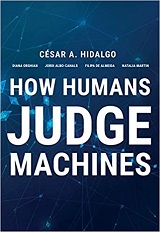
|
FreeComputerBooks.com
Links to Free Computer, Mathematics, Technical Books all over the World
|
|
- Title How Humans Judge Machines
- Author(s) Cesar A. Hidalgo, Diana Orghiain, Jordi Albo Canals, Filipa de Almeida and Natalia Martin
- Publisher: The MIT Press (February 2, 2021); eBook (MIT Open Access Edition)
- License(s): CC BY-NC-ND 4.0
- Hardcover 256 pages
- eBook PDF files
- Language: English
- ISBN-10: 0262045524
- ISBN-13: 978-0262045520
- Share This:

|
A detailed examination of people's reactions to machine actions as compared to human actions. Through dozens of experiments, this book explores when and why people judge humans and machines differently.
How would you feel about losing your job to a machine? How about a tsunami alert system that fails? Would you react differently to acts of discrimination depending on whether they were carried out by a machine or by a human? What about public surveillance?
This book compares people's reactions to actions performed by humans and machines. Using data collected in dozens of experiments, this book reveals the biases that permeate human-machine interactions.
It presents a unique perspective on the nexus between AI and society. Anyone interested in the future of AI ethics should explore the experiments and theories in How Humans Judge Machines.
It uses hard science to take on these pressing technological questions. Using randomized experiments, it creates revealing counterfactuals and build statistical models to explain how people judge artificial intelligence and whether they do it fairly. Through original research, How Humans Judge Machines bring us one step closer tounderstanding the ethical consequences of AI.
About the Authors- Cesar A. Hidalgo, Director of the Center for Collective Learning at the University of Toulouse.
- Artificial Intelligence
- Human-Computer Interaction and Virtual Reality
- Robotics and Robot Programming
- Machine Learning

- How Humans Judge Machines (Cesar A. Hidalgo, et al)
- The Mirror Site (1) - PDF
- The Mirror Site (2) - PDF
-
 What Was Artificial Intelligence? (Sue Curry Jansen)
What Was Artificial Intelligence? (Sue Curry Jansen)
Prescient autopsy of AI self-selling - the rhetoric of the masculinist sublime - is reprinted with a new introduction. Now an open access book, it's a message in a bottle, addressed to Musk, Bezos, and the latest generation of AI myth-makers.
-
 Playful Machine: Theoretical and Practical Self-Organizing Robots
Playful Machine: Theoretical and Practical Self-Organizing Robots
The book develops guided self-organization, a new method that helps to make the playful machines fit for fulfilling tasks in the real world. It comes with a robotics simulator inviting also the non-scientific reader to simply enjoy the fabulous world of playful machines.
-
 Foundations of Robotics: Approach with Python and ROS
Foundations of Robotics: Approach with Python and ROS
This book introduces key concepts in robotics in an easy to understand language using an engaging project-based approach. It covers contemporary topics in robotics, providing an accessible entry point to fundamentals in all the major domains.
-
 Modern Robotics: Mechanics, Planning, and Control
Modern Robotics: Mechanics, Planning, and Control
Offers a distinct and unified perspective of the mechanics, planning and control of robots. Ideal for self-learning, or for courses, as it assumes only freshman-level physics, ordinary differential equations, linear algebra and a little bit of computing background.
-
 Introduction to Autonomous Robots (Nikolaus Correll, et al)
Introduction to Autonomous Robots (Nikolaus Correll, et al)
It provides a broad algorithmic perspective on the mechanics and dynamics of robots, offers a much-needed resource for the computational fundamentals behind the design and control of autonomous robots, balances the impact of hardware and software.
-
 The Amazing Journey of Reason: from DNA to Artificial Intelligence
The Amazing Journey of Reason: from DNA to Artificial Intelligence
This book analyses the evolution of complex structures (Organisms, or organized, living, systems) in the universe - from the subatomic particles after the Big Bang onwards - in order to understand the emergence of today's interconnected society.
-
 Robots and AI (Lili Yan Ing, et al)
Robots and AI (Lili Yan Ing, et al)
The book explains new approaches on how robots and artificial intelligence affect the world economy by presenting detailed theoretical framework and country-specific as well as firm-product level-specific exercises.
-
 Modern Robotics with OpenCV (Widodo Budiharto)
Modern Robotics with OpenCV (Widodo Budiharto)
This book is written to provide an introduction to intelligent robotics using OpenCV. It gives you a firm grounding in computer vision and OpenCV for building simple or sophisticated Robotics applications.





